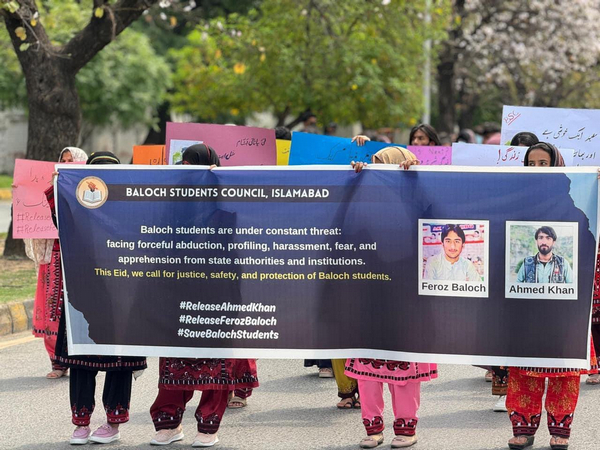Pakistan: Baloch Students Council calls for release of two students
The Islamabad chapter of the Baloch Students Council (BSCI) on Wednesday wrote an open letter demanding the release of two Baloch students Feroz Baloch and Ahmed Khan belonging to the PMAS-Arid Agriculture University at Rawalpindi.

- Country:
- Pakistan
The Islamabad chapter of the Baloch Students Council (BSCI) has penned an open letter demanding the release of two Baloch students Feroz Baloch and Ahmed Khan belonging to the PMAS-Arid Agriculture University at Rawalpindi, whom it claimed were being held "in secret torture cells." Posting the letter on X on Wednesday, the BSCI stated, "Even though these violations have been happening for a long time, Feroz Baloch and Ahmed Khan, who are students at PMAS Arid Agriculture University in Rawalpindi, are still being held in secret torture cells by the state."
The student's body termed the situation of Balochistan as "a real image of oppression and suppression." In the letter, the Baloch Students Council (Islamabad) mentioned that "masses are facing severe human rights violations by state's regular and irregular forces and death squads, who are fully privileged and permitted to commit every kind of human rights violation with full impunity and excessive use of force."
"In their fullest form, these violations are the real depiction of genocide. None of the homes and regions are left where peace and comfort can be found; the whole of Balochistan is converted into a military cantonment where brute and excessive use of force is visible," it added. The BSCI alleged that the individuals are victims and their Baloch identity is their "biggest sin and crime." It alleged that atrocities and brutalities have been found in each corner of Balochistan.
BSCI stated, "Individuals and collectives are both victims, where only Baloch identity is their biggest sin and crime. These atrocities and brutalities are found in every corner of Balochistan. The narrative of peace, progress, and development is ironical and paradoxical, juxtaposed with ground reality. These forms of genocide include extrajudicial killings, enforced disappearances, forceful eviction and migration, target killings, and mass graves." The letter also exposed how the law enforcement agencies strategically oppressed the Baloch student community. Raising the same issue, the BSCI in the letter said that "the political and conscious minds of the Baloch students are the prime target of the state machinery."
It mentioned that "in the initial phase of this decade, in 2000, Baloch students were the most affected. An entire generation was eliminated with force and a crackdown imposed; thousands of individuals and student leaders were extra-judicially killed, forcibly disappeared, became victims of target killing, and were targets of law enforcement agencies and local death squads". In the letter, BSCI accused the state of compelling the Baloch youths to "quit and leave" the educational institutions of Balochistan. It added that the Baloch students then moved to universities in other parts of Pakistan, including Islamabad, Punjab and other provinces.
The Baloch Students Council (Islamabad) said, "These circumstances created by the state compelled the Baloch youths to "quit and leave" the educational institutions of Balochistan, the military- cum-institutions, which were converted into military base camps." "Then, several Baloch students turned towards the universities of Islamabad, Punjab and other provinces, but the casual situation of the worst human rights violations persisted here as well, in extreme cases. The racial profiling, harassment, surveillance, and abduction continued," it added.
In the letter, the BSCI also questioned Pakistan's mainstream media. The letter mentioned that since the formation of Balochistan, the Baloch community has raised its voice against the oppression of the people of Balochistan. The letter mentioned that the media's misleading portrayal of Balochistan hides the grievances and suffering of the Baloch people. It also called on international human rights organisations to hold Pakistan accountable for conducting injustices against Baloch masses in the form of racial harassment, profiling, enforced disappearances and judicial killings. (ANI)
(This story has not been edited by Devdiscourse staff and is auto-generated from a syndicated feed.)
ALSO READ
Daring Rescue Operation: Security Forces Save 104 Passengers from Hijacked Train in Balochistan
Crisis in Balochistan: Train Hijacking Sparks Global Outrage
Dramatic Train Rescue: Pakistani Forces Combat Baloch Insurgents
Terror on the Tracks: Baloch Militants Attack Passenger Train in Balochistan
Crisis on the Rails: Jaffar Express Hijacked by Baloch Militants










